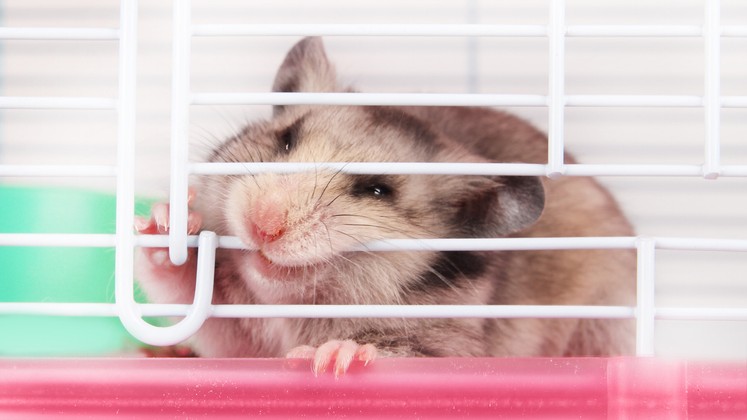5 ways to help a stressed hamster, according to a vet
Is your hamster stressed? An expert shares the symptoms, causes, and how to help them.

If you want to help your stressed hamster, it’s important to get to the root of the problem and know the signs of stress to look out for.
This might come as a surprise, but hamsters are very sensitive creatures and are highly susceptible to stress, which, in some cases, can even lead to death. To keep your furry friend happy and healthy, you’ll need to provide them with the best hamster toys for enrichment, a cage with sufficient space, and a clean environment to live in.
Below, expert vet Dr. Hannah Godfrey explains why your hamster might be feeling stressed, what the symptoms look like, and how to help them if you suspect they’re unwell. She has also compiled a complete guide on hamster body language.
Hamster stress symptoms
If your hamster is stressed, you might notice that they have some of the following symptoms:
- Hair loss/fur changes Stressed hamsters will sometimes overgroom or pull their fur out, leading to bald patches or hair thinning. But, even aside from self-inflicted baldness, stress can cause your hamster’s fur to change over time to become more sparse, more oily, or more dishevelled.
- Aggressive behavior Hamsters who are feeling stressed are much more likely to lash out. So, mind your fingers and give your hamster some space while you try to reduce their stress levels.
- Cage biting If you see your hamster regularly biting at the bars or the plastic on their cage, this could signify that they are feeling stressed.
- Digging Excessive digging and other repetitive behaviors like rolling, scratching, licking, or scurrying in circles can all be signs of a stressed hamster.
- High-energy behaviors When people are stressed, sometimes they withdraw and have little energy, but stressed hamsters are often hyperactive and restless. It's common for stressed hamsters to run the same route around their cage over and over again or to spend lengthy spells on their exercise wheel.
- Vocalising Although you might be used to your hamster keeping you awake at night as they noisily go about their daily routine, you probably haven't heard your hamster making their own noises. Hamsters are normally pretty quiet, but when they're stressed, you might notice them making more noise than usual. This could be their way of communicating that they are nervous, scared, or distressed.

Why is my hamster stressed?
Hamsters can become stressed for multiple reasons. Hamster stress can be caused by fear. Being so small, it’s easy to understand why hamsters might feel afraid sometimes. Scary situations for hamsters include loud noises, rough handling, being held at a height, sudden movements, or unfamiliar environments. For example, if you buy a new cage for your furry friend, even if it’s the best hamster cage, the fact that it is a new environment that they’re not used to could cause them stress.
Hamsters can also become stressed because they aren’t getting enough mental and physical stimulation. Boredom and a lack of enrichment can lead to frustration and stress symptoms. Stress symptoms can also develop if your hamster is unwell or in pain, so it's essential to get to know your hamster's normal behavior so that you can spot changes quickly.
TRIXIE Small Animal Suspension Bridge
If you’re looking for an easy way to keep your hamster entertained, this fun, budget-friendly toy is the perfect choice. It features monkey bars, a rope ladder, a hoop with a rope ring, and a suspension bridge, and it was voted the best overall toy in our guide.
How do you calm down a stressed hamster?
The most important thing you must do if you think your hamster is stressed is to take them to a vet. The vet can check for signs of pain or illness and give you advice on how to combat your hamster’s stress. Once you’re sure there’s no medical reason for your hamster’s anxious behavior, you can start looking for things to tweak in their environment or your handling.
You should ensure that your hamster’s home is the perfect size for them, with plenty of space for exercise, eating, drinking, and relaxing. Here are some tips for selecting the right size hamster cage.
Ensure that their cage is in a quiet part of the house, away from other pets and without much footfall. Keeping up with a regular and thorough cleaning regime will also help to alleviate their stress, as will providing them with chews and toys for enrichment. When it comes to handling, it's not always easy to help your hamster feel more confident, especially if they haven't been handled from a young age.
However, making sure that you don't smell of chemicals or perfume, keeping your movements slow, and holding them close to the ground will help.

Hamster body language guide
If you own a hamster, you’ll soon get to know and understand their body language if you pay close attention. But here’s an easy guide for what your hamster is trying to tell you:
- Happy A happy hamster might stretch and yawn to show they are relaxed. If you watch your hamster display their normal behaviors like grooming and digging, this is a sign that they are happy. If they watch you back and have their ears pointed up, this is a sign that they're interested and curious, rather than afraid.
- Scared A hamster who is scared or feeling threatened might stand on their hind legs or turn on their back, showing their teeth. They often puff out their cheeks and hold their ears flat or forward. You might hear them vocalising and, if you don’t give them space, they might bite.
- Depressed A depressed hamster might be more lethargic. However, it's common for boredom and under-stimulation to cause hyperactivity. So, you might notice them turning or rolling repeatedly, biting their cage, or over-using their wheel.
Stressed hamster: Frequently asked questions
Do hamsters bite when stressed?
It's very common for hamsters to bite when they are stressed. They might be feeling irritable, threatened, or unwell. If your hamster has suddenly started biting or behaving aggressively, speak to a veterinarian about the possible causes.
Can hamsters die from stress?
Hamsters are very susceptible to stress, and sudden stress can put extra strain on their heart and other body organs. If they are old or have poor underlying health, they are even more at risk of sudden death from stress. We have a feature that answers how long do hamsters live?
Although hamsters are tiny, hamster stress is a big problem. If you take home a little ball of fluff, it's worth doing your research to make sure you handle them correctly and provide them with everything they need for a happy and relaxed life.

How do I know if my hamster is traumatized?
As hamsters are prey animals, they’re very good at hiding signs of illness and stress to avoid looking weak to predators, explains Dr. Godfrey. However, they might show the following symptoms if they’re traumatized:
1. Repetitive behaviors, such as constant gnawing or overgrooming
2. Hiding away more than usual
3. Reduced appetite
4. Freezing when approached and avoiding interaction
5. Aggressive behaviors, such as flattening their ears, baring their teeth, and attempting to bite
How do I know if a hamster is settling in?
A settled hamster is bright and curious and will spend their time exploring, exercising, and digging, according to Dr. Godfrey.
She says: “A happy hamster will have a good appetite and keep themselves busy by collecting food in their cheek pouches, to store in their nest for later. Your hamster should be toileting normally and you may even see them marking their territory by rubbing themselves against their cage and toys. You will see relaxed behavior like stretching, grooming, and climbing. Your hamster may also be interested when you approach your enclosure, accepting food from you or gentle handling.”
You might also want to read: Why is my hamster sleeping in the corner of their cage?

Dr Hannah Godfrey has more than 10 years’ experience as a veterinary surgeon, having graduated from the Royal Veterinary College in London in 2011. She started out as a small animal practitioner involved in surgery, consultation treatment and imaging of pets and later moved into a telemedicine triage role. She has a passion for soft tissue surgery and dentistry.
PetsRadar Newsletter
Get the best advice, tips and top tech for your beloved Pets
Dr Hannah Godfrey is a small animal vet who graduated from the Royal Veterinary College in 2011 and began work straight away at a busy mixed practice. Initially, she treated all species, but focussed on small animals from 2014. She has a passion for soft tissue surgery, ultrasound, and canine and feline dentistry, having completed additional training in these areas.
- Megan MilsteadStaff Writer

